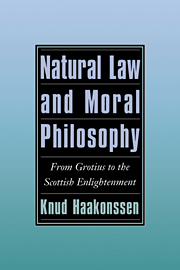Book contents
- Frontmatter
- Contents
- Acknowledgements
- Introduction: The Scottish Enlightenment in the history of ideas
- 1 Natural law in the seventeenth century
- 2 Natural law and moral realism: The civic humanist synthesis in Francis Hutcheson and George Turnbull
- 3 Between superstition and enthusiasm: David Hume's theory of justice, government, and politics
- 4 Adam Smith out of context: His theory of rights in Prussian perspective
- 5 John Millar and the science of a legislator
- 6 Thomas Reid's moral and political philosophy
- 7 Dugald Stewart and the science of a legislator
- 8 The science of a legislator in James Mackintosh's moral philosophy
- 9 James Mill and Scottish moral philosophy
- 10 From natural law to the rights of man: A European perspective on American debates
- Bibliography
- Index
5 - John Millar and the science of a legislator
Published online by Cambridge University Press: 05 June 2012
- Frontmatter
- Contents
- Acknowledgements
- Introduction: The Scottish Enlightenment in the history of ideas
- 1 Natural law in the seventeenth century
- 2 Natural law and moral realism: The civic humanist synthesis in Francis Hutcheson and George Turnbull
- 3 Between superstition and enthusiasm: David Hume's theory of justice, government, and politics
- 4 Adam Smith out of context: His theory of rights in Prussian perspective
- 5 John Millar and the science of a legislator
- 6 Thomas Reid's moral and political philosophy
- 7 Dugald Stewart and the science of a legislator
- 8 The science of a legislator in James Mackintosh's moral philosophy
- 9 James Mill and Scottish moral philosophy
- 10 From natural law to the rights of man: A European perspective on American debates
- Bibliography
- Index
Summary
Introduction
Forty years ago Duncan Forbes developed his concept of ‘scientific Whiggism’ in a classic essay on Adam Smith and John Millar. With subtle changes towards ‘sceptical Whiggism’ this line of interpretation was subsequently pursued in depth as far as Hume and Smith are concerned. In Millar's case the field of interpretation has been dominated by scholars who, instead of seeing him as sceptical and ‘scientific’ in his approach to the great questions of political legitimacy and social and political change, see him rather as an extremely engagé bourgeois ideologist concerned with the preservation, in modern society, of humanist ideals of virtue and liberty and with the social and political changes required by this. Some of these contributions have been as much occupied with Millar's political and legal activities as with his writings, and much light has in fact been thrown on the former. The result is, however, that one is often left in doubt about the relationship between his science and his politics. In its own way this serves to indicate that Millar's main works do not contain much in the way of explicit normative socio-political doctrine and that their whole mode in this respect is the kind of sceptical indirectness which Forbes captured.
This picture is further complicated when we extend our field of inquiry to include the publication of some anonymous pamphlets. There are two such pamphlets which – either directly or indirectly – derive from Millar: the Letters of Crito and the Letters of Sidney.
- Type
- Chapter
- Information
- Natural Law and Moral PhilosophyFrom Grotius to the Scottish Enlightenment, pp. 154 - 181Publisher: Cambridge University PressPrint publication year: 1996
- 1
- Cited by



